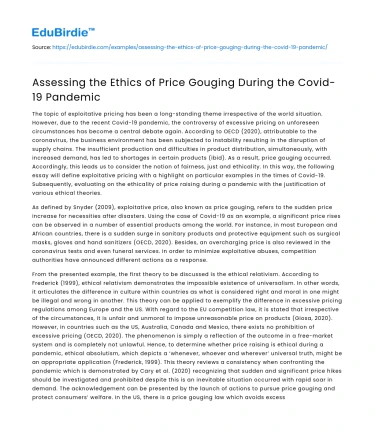The topic of exploitative pricing has been a long-standing theme irrespective of the world situation. However, due to the recent Covid-19 pandemic, the controversy of excessive pricing on unforeseen circumstances has become a central debate again. According to OECD (2020), attributable to the coronavirus, the business environment has been subjected to instability resulting in the disruption of supply chains. The insufficient production and difficulties in product distribution, simultaneously, with increased demand, has led to shortages in certain products (ibid). As a result, price gouging occurred. Accordingly, this leads us to consider the notion of fairness, just and ethicality. In this way, the following essay will define exploitative pricing with a highlight on particular examples in the times of Covid-19. Subsequently, evaluating on the ethicality of price raising during a pandemic with the justification of various ethical theories.
As defined by Snyder (2009), exploitative price, also known as price gouging, refers to the sudden price increase for necessities after disasters. Using the case of Covid-19 as an example, a significant price rises can be observed in a number of essential products among the world. For instance, in most European and African countries, there is a sudden surge in sanitary products and protective equipment such as surgical masks, gloves and hand sanitizers (OECD, 2020). Besides, an overcharging price is also reviewed in the coronavirus tests and even funeral services. In order to minimize exploitative abuses, competition authorities have announced different actions as a response.
Save your time!
We can take care of your essay
- Proper editing and formatting
- Free revision, title page, and bibliography
- Flexible prices and money-back guarantee
From the presented example, the first theory to be discussed is the ethical relativism. According to Frederick (1999), ethical relativism demonstrates the impossible existence of universalism. In other words, it articulates the difference in culture within countries as what is considered right and moral in one might be illegal and wrong in another. This theory can be applied to exemplify the difference in excessive pricing regulations among Europe and the US. With regard to the EU competition law, it is stated that irrespective of the circumstances, it is unfair and unmoral to impose unreasonable price on products (Giosa, 2020). However, in countries such as the US, Australia, Canada and Mexico, there exists no prohibition of excessive pricing (OECD, 2020). The phenomenon is simply a reflection of the outcome in a free-market system and is completely not unlawful. Hence, to determine whether price raising is ethical during a pandemic, ethical absolutism, which depicts a ‘whenever, whoever and wherever’ universal truth, might be an appropriate application (Frederick, 1999). This theory reviews a consistency when confronting the pandemic which is demonstrated by Cary et al. (2020) recognizing that sudden and significant price hikes should be investigated and prohibited despite this is an inevitable situation occurred with rapid soar in demand. The acknowledgement can be presented by the launch of actions to pursue price gouging and protect consumers’ welfare. In the US, there is a price gouging law which avoids excessive pricing for essential products during abnormal supply chain disruptions, whereas the European competition authorities have enforced a series of tasks forces such as temporary price controls on hygiene products and investigating overpricing of face masks among online platforms (OECD, 2020).
However, although the word ‘exploitative’ is denoted as an unethical behavior in its nature, one may argue that ethical absolutism does not explain whether the ethical view is morally justifiable. Nevertheless, while ethical absolutism summarizes an unethical behavior in exploitative pricing during pandemic, ethical relativism does not provide a clear ethical guideline in price gouging behavior under normal circumstances.






 Stuck on your essay?
Stuck on your essay?

